Tagged: “forgiveness research”
Does Forgiveness Work? Let’s Ask the Experts. . .
The benefits of forgiveness have been discussed and debated for centuries but scientific evidence that forgiveness actually “works” has been scant. All that has changed during the past few decades as legions of psychologists and clinicians have begun studying the ancient virtue from a stringently documented, peer-reviewed empirical perspective.
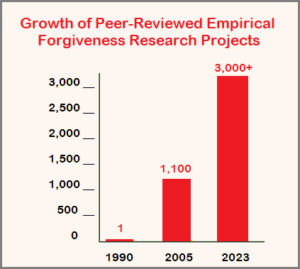 Dr. Robert Enright, an educational psychologist labeled the “forgiveness trailblazer” by Time magazine (and co-founder of the International Forgiveness Institute), published the first scientific study on person-to-person forgiveness in 1989. In the 15 years following the publication of that article in the Journal of Adolescence, the number of published forgiveness articles had jumped to more than 1,100. And today, researchers can pore through more than 3,000 published articles brandishing empirical evidence on the virtue of forgiveness.
Dr. Robert Enright, an educational psychologist labeled the “forgiveness trailblazer” by Time magazine (and co-founder of the International Forgiveness Institute), published the first scientific study on person-to-person forgiveness in 1989. In the 15 years following the publication of that article in the Journal of Adolescence, the number of published forgiveness articles had jumped to more than 1,100. And today, researchers can pore through more than 3,000 published articles brandishing empirical evidence on the virtue of forgiveness.
Here is a quick look at several recent research reports related to the benefits of forgiveness:
Forgiveness Reduces Suicidal Behavior
Suicide is the second leading cause of death for young adults and about 1,100 college students die by suicide each year (Centers for Disease Control and Prevention). According to a study of 158 college students, all suffering from mild to severe depression, psychologists at East Tennessee State University found that:
“Students who are more capable of forgiving themselves and others after stressful life events or interpersonal problems have lower rates of suicidal behavior than their peers who are less able to forgive. This study points out that interventions that boost levels of forgiveness can increase self-esteem, hopefulness, positive emotions toward other people, and perceived self-control while reducing levels of depression, anxiety, and drug use.”
Source: Forgiveness, Depression, and Suicidal Behavior Among a Diverse Sample of College Students.
![]()
Forgiveness Education Program Reduces Depression, Anxiety, and Stress
After implementation of Dr. Enright’s Forgiveness Education curriculum for high school students in Turkey, study results demonstrated that: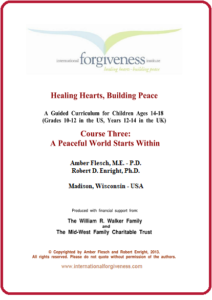
“Forgiveness Education has led to significant decrease in symptoms of depression, anxiety, and stress. Conclusion: Forgiveness Education can be used effectively for adolescents in school settings.”
![]()
Even Brief Enright Forgiveness Education Programs Improve Health
Chinese college students demonstrated positive improvement in emotional health following brief (4 sessions compared to the normal 12 sessions) exposure to Enright Forgiveness Education curriculum classes. According to the study:
“The analysis of the pretest and post-test scores indicated that both the Enright Psycho-social Programme and the Chinese Value-oriented Programme had positive effects on improving participants’ general emotional forgiveness, decreasing their negative emotions toward the offender, and improving life satisfaction.”
![]()
Forgiveness Significantly Predicts Life Satisfaction
Researchers have begun to investigate the relationship between happiness and subjective factors like Forgiveness. A study with 380 students from different departments of Bursa Uludag University in Bursa, Turkey, found that:
“Happiness has been found to be negatively related to stress and positively related to positive emotions, satisfying relationships, self-esteem, forgiveness, self-compassion, and quality of friendships.Results in this study also indicate that forgiveness and life satisfaction are positively related and that forgiveness significantly predicts life satisfaction. For this reason, my results are important for psychological healthcare workers, who can include these variables into their supportive and preventive programs in order to assess important characteristics that contribute to good psychological health.”
Source: Predictive effects of subjective happiness, forgiveness, and rumination on life satisfaction.
![]()
In your research studies on forgiveness, what is the shortest intervention you have done that was successful in healing people from trauma? I am not talking about studies that others do with college students who are not traumatized in a psychiatric sense. Instead, I am talking about the kind of studies that have characterized your pattern of research as you work with traumatized samples.
The shortest amount of time needed for a successful forgiveness intervention with traumatized people is a study by Hansen and Enright (2009) in which our forgiveness process was implemented over a 4-week period, once a week for about an hour each time. This was done individually for each participant who was in hospice because of a diagnosis of terminal cancer. The participants, knowing they were dying, were very focused on the forgiveness intervention and their hope for the future increased as they forgave. I think the fact that they knew they were dying played a part in how quickly they forgave. In other words, 4-weeks for other traumatized populations probably would not be as effective because people need time to engage in the process of forgiveness.
This is the reference to that research in hospice:
Hansen, M.J., Enright. R.D., Baskin, T.W., & Klatt, J. (2009). A palliative care intervention in forgiveness therapy for elderly terminally-ill cancer patients. Journal of Palliative Care, 25, 51-60.
Here is a link to the research: Forgiveness Therapy as Palliative Care.
Forbes: Forgiveness has “Immense Benefits”
Forbes Magazine is undeniably one of the most highly read news publications in the world. With 49 global editions licensed in 83 countries and printed in 28 languages, it reaches more than 140 million people worldwide on a monthly basis through direct subscription and its website.
Now the 105-year-old publication has teamed up with medical experts to tout the “immense benefits” of forgiveness on both mental and physical health in an article titled “Forgiveness: How to Forgive Yourself and Others.” It was published on Aug. 31, 2022, and received the coveted Forbes Health Advisory Board seal of approval.
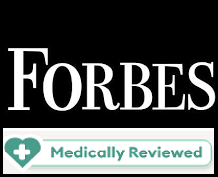
“The benefits of forgiveness greatly outweigh holding a grudge, and can affect both mental and physical health in profound ways,” according to the article. “While forgiveness may feel impossible in certain circumstances, forgiveness experts—yes, this is a real field of study—say that forgiveness can be learned no matter how great the offense. Even if the person you have the hardest time forgiving is yourself, this too, they say, can be learned.”
The Forbes article relies extensively on the work of Dr. Robert Enright and calls him “a pioneer in the scientific study of forgiveness” and “a leading expert on forgiveness.” Dr. Enright is a professor of educational psychology at the University of Wisconsin-Madison and co-founder of the International Forgiveness Institute who last year was awarded the 2022 American Psychological Foundation Gold Medal Award for Impact in Psychology.
“As you can see, all the ways of practicing forgiveness as well as its benefits aren’t really about the person who wronged you; it’s about yourself,” according to the Forbes article. “Forgiveness isn’t easy, but it can be done. When you commit to putting it into practice, your mental and physical health will both be better for it.”
“Clearly forgiveness has immense benefits.”
Forbes Magazine
Here are the scientifically-demonstrated benefits of forgiveness cited in the article:
Mental Benefits of Practicing Forgiveness
- You experience less anxiety when you forgive
- Inability to forgive and depression can be linked
- You feel more hopeful and empowered when you forgive
- You’re less likely to hurt others
Physical Benefits of Practicing Forgiveness
- Forgiveness is good for your heart
- It’s associated with better sleep
- Forgiving supports the immune system
In addition to lauding the benefits of forgiveness, the article includes a helpful list of “10 Ways to Practice Forgiveness for Yourself and Others.”
Read the full Forbes Magazine article.
A Fireside Chat with Dr. Robert Enright
Dr. Robert Enright, the 2022 recipient of the prestigious American Psychological Foundation (APF) Gold Medal Award for Impact in Psychology, is featured in a just-released video presentation titled “APF at Home: A Fireside Chat with Dr. Robert Enright.”
The 1 hr. 25 min. fireside chat is part of a series developed by the APF that focuses on pioneering American psychologists “whose work has had a game-changing impact on the field of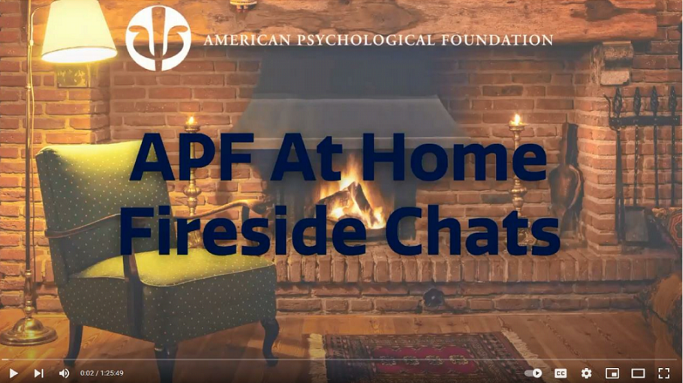 psychology.” Dr. Enright, founder of the International Forgiveness Institute (IFI), has been called “the forgiveness trailblazer” by Time magazine. His 37-years of forgiveness research has resulted in noteworthy innovations in forgiveness education and forgiveness therapy.
psychology.” Dr. Enright, founder of the International Forgiveness Institute (IFI), has been called “the forgiveness trailblazer” by Time magazine. His 37-years of forgiveness research has resulted in noteworthy innovations in forgiveness education and forgiveness therapy.
“Fireside Chats,” became a popular communications tool when President Franklin Roosevelt began a series of radio broadcasts that aired from 1933 through 1944. They were planned as conversations rather than stiff public speeches and were widely listened to because all the national radio networks carried them. In them, the President appeared to talk with his listeners rather than lecturing at them. And, yes, he actually sat next to the White House fireplace during the broadcasts.
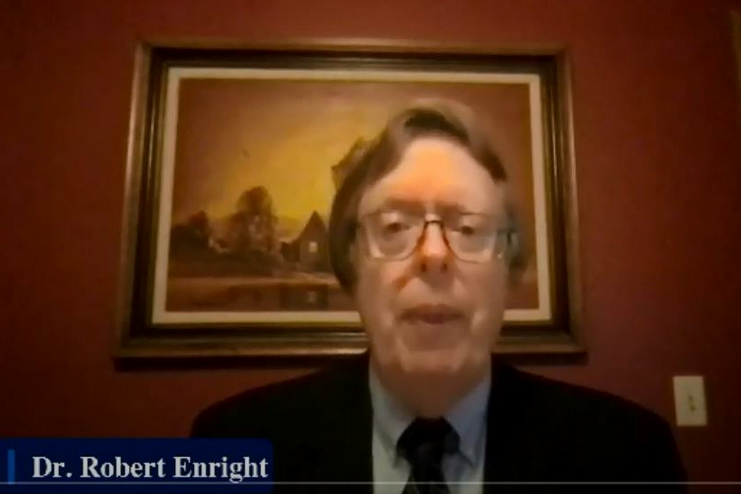 The fireside chats now being produced by the APF are intended to replicate that informal ambience. The latest interview, for example, features APF Trustee Dr. Katherine Nordal chatting with Dr. Enright. She asks him questions like how he selected forgiveness as the topic of his life’s work, how his Process Model of Forgiveness can be used in therapy interventions, and how forgiveness can become the crucial missing piece of the world’s peace puzzle. Dr. Enright answers questions submitted by viewers of the live presentation during the final 20 minutes of the session.
The fireside chats now being produced by the APF are intended to replicate that informal ambience. The latest interview, for example, features APF Trustee Dr. Katherine Nordal chatting with Dr. Enright. She asks him questions like how he selected forgiveness as the topic of his life’s work, how his Process Model of Forgiveness can be used in therapy interventions, and how forgiveness can become the crucial missing piece of the world’s peace puzzle. Dr. Enright answers questions submitted by viewers of the live presentation during the final 20 minutes of the session.
Dr. Nordal is well-equipped to conduct the APF fireside chat with Dr. Enright. She is a licensed psychologist whose distinguished career included owning and managing a full-time group private practice in Mississippi for 28 years. She spent another 10 years as Executive Director for Professional Practice for the American Psychological Association (APA) before retiring in 2018.
APF is the private grant-making arm of the APA and provides more than a million dollars annually in awards to fund research by psychologists and psychology students.
More Information:
A Fireside Chat with Dr. Robert Enright – Watch the entire presentation on YouTube.
APF at Home Fireside Chats – Watch all the videos in the series.
I am doing academic work on forgiveness and need an answer to this question: What is the first scientific study on forgiveness therapy ever published?
The first forgiveness therapy study (in which data were gathered and statistics applied to the results) ever published was by Hebl and Enright in 1993. Here is the reference to that work:
Hebl, J. H., & Enright, R. D. (1993). Forgiveness as a psychotherapeutic goal with elderly females. Psychotherapy, 30, 658-667.



